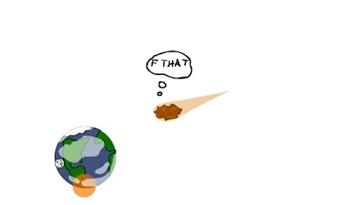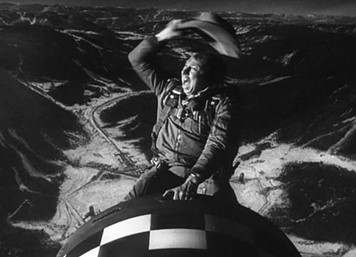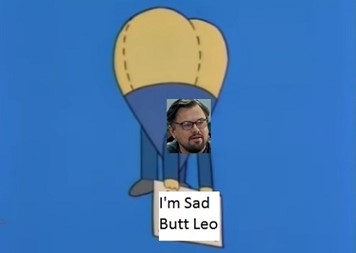THE SPOILERS ARE NIGH: This contains heavy spoilers for Don’t Look Up and minor spoilers for Last Night, 4:44 Last Day on Earth, and It’s a Disaster.
My family watched Don’t Look Up on Christmas Day, looking for something decently entertaining on the old Netflix after a lazy holiday and big dinner, and it feels like this is surely what writer-director Adam McKay was hoping for by releasing the movie to streaming on December 24. Lure in those viewers looking for something funny while they hang out with relatives – oh, it’s the guy who did Talladega Nights and The Big Short! Let’s watch! – and sock them with a movie where everyone dies at the end, to really make them think about what the film has to say. If so, the joke is on him, as Don’t Look Up is just another entry in my family’s accidental tradition of Movies We Wind Up Watching On Christmas That Really Don’t Fit The Holiday Spirit (other notables include Enemy At The Gates, The Last King Of Scotland and Sin City). It’s a crummy movie, not the end of the world.
The end of the world and how humans cause it through idiocy and inaction is the subject of Don’t Look Up, which follows scientists Leonardo DiCaprio and Jennifer Lawrence as they discover an extinction-level comet is barreling toward Earth and try to get the authorities and the public to care enough to stop it. But the people in charge – notably President Meryl Streep and tech billionaire Mark Rylance (doing a pitch-perfect imitation of the most evil man on the planet, Fred Armisen) – are too mendacious and short-sighted and incompetent to do anything, and the public is too easily duped and pacified into both believing in bad plans and denying the existence of the threat at all. Also, DiCaprio bangs Cate Blanchett’s Legally Not Kelly Ripa, despite having a wife in Melanie Lynskey (casting Lynskey for this kind of role is like taking your Ferrari to the grocery store) and Lawrence bangs Timothee Chalamet’s himbo Christian skater boi. At one point Ariana Grande gets a five-minute concert video.

Early on, McKay pauses the movie to let us viewers know that the Planetary Defense Coordination Office (where Rob Morgan works as the agency’s leader) is a real agency, and somewhat snarkily displays their logo. It feels similar to the energetic fourth-wall-breaking of The Big Short, but McKay’s instincts in this regard fail him elsewhere. Repeated cuts to photos in the Oval Office of Streep hanging out with the Clintons and other political figures are jarring and odd, using real-world associations to indict the fictional person that McKay created, and the movie soon loses even this misguided flair and becomes a morass of soggy scenes featuring stupid and whiny characters. The funny moments usually involve an overtly funny person saying intentionally funny things, like Chief of Staff Jonah Hill playing a Jonah Hill character and crudely and accurately insulting Lawrence, as opposed to things that are funny because of how people are interacting with each other and how those interactions are shot and edited*. The most consistent device in the movie is McKay’s repeated cutaways to nature footage, showing all the animals that are going to die because of this environmental catastrophe; this is extremely funny if unintentionally so. In trying to make a point, McKay winds up aping the soothing po-faced corporate doomsday signoff from Gremlins 2: The New Batch.

Throughout Don’t Look Up, DiCaprio and especially Lawrence get frustrated as they point out a dangerous problem that powerful people and/or people working together can solve with some effort and concern for the greater good, but see their extremely clear and accurate warnings disdained and dismissed. The title of the movie comes from their breakthrough moment of getting people to recognize the danger (“Just look up!”) being countered and co-opted by a president insisting people do the opposite and being joined by supporters eager to embrace ignorance. It’s an extremely apt metaphor for the response to the coronavirus pandemic! Often frustratingly so, it’s not fun to see this stuff all over again but no one said movies have to be fun. On the other hand, McKay and storytelling partner David Sirota have been open about this being a metaphor for the response to our climate destruction, and movies should have metaphors that don’t suck rocks. All those cute animals would be killed by an incoming comet whether humans are present or not, our failure is bad for us but irrelevant to the planet. It’s part of the movie’s overall tendency to be arrogant about human shortcomings.
Because “our” failure, as humanity, is extremely U.S.-centric in this movie. NASA is the agency that handles the initial Armageddon-esque blowing up the damn space rock plan, which is nixed by Rylance so his company can harvest the comet’s metals to make a ton of money (his evil Earth-destroying greed is a lot more accurate than Neil Stephenson’s heroic tech bro trying to save the planet in Seveneves, at least). There’s a brief mention of other countries banding together to try to stop the comet, their rocket blows up before getting off the ground** and that’s that. This all happens long after DiCaprio and Lawrence are dismissed by the U.S. government and cool their heels for a while, as opposed to talking to literally any other government about the giant death asteroid.
There is a movie in here that is a mean and vicious satire not of ignorance or whatever, but specifically of liberal failure. Rylance dismisses DiCaprio as a “lifestyle idealist” personality type, someone who is interested in appearing good for the image of goodness it gives them, and it is a very solid own. DiCaprio’s seduction into half measures of working within the system, shown by his literal seduction by Ripa, is tedious, as is the movie’s insistence on taking down those vacuous morning shows for soft-pedaling hard news. It is dull to insult a stupid show for refusing to be smart, at least at the length McKay does so here, but what is interesting is how DiCaprio keeps going on this show, participating in it to achieve his goals. He and Lawrence are most active working the Just Look Up campaign, which has buttons and posters and eager volunteers and a big concert with that Ariana Grande song, all of which amounts to raising awareness as opposed to taking any action (that is for those offscreen Chinese and Russian characters). It’s a lot of effort expended on self-aggrandizing but useless ends, a potentially rich subject; but it’s so flabby any satirical snap is lost. Grande’s song goes on for so long that by some kind of inverse Rake Gag logic it becomes sincere again. And there’s a larger issue here too.

After Rylance trashes DiCaprio’s superficial beliefs he delivers the knockout punch – according to his company’s always-correct algorithm, DiCaprio will die alone. DiCaprio does die, but he focuses on getting back together with his wife and exits this plane surrounded by his family and upward-looking friends like Lawrence and Chalamet and Morgan. The movie treats this as a victory of sorts, that while others despair and panic these heroes – if only we had listened! – accept the end with grace (literally, as delivered before dinner by Chalamet).
It is hard enough to comprehend our own ends, in some ways the destruction of the planet is easier to grasp in terms of spectacle. But that doesn’t have the deep impact (ho HO) of the end of a person, so end-of-the-world movies often focus on people to understand what’s at stake. Even a movie with no “relatable” characters like Dr. Strangelove grounds its destruction in human pettiness and frustration and while Don’t Look Up would clearly love to be mentioned in the same breath as Strangelove, the emphasis on DiCaprio’s redemption puts it in the company of more personal apocalypses despite the large and weightless scale that is to be expected in a Netflix production.
In Don McKellar’s sublime Last Night, for example, the end of the world is a given and the two protagonists are trying to make one final connection before the earth ends (it is unspecified how, but inevitable); even though the final outcome is known that one moment beforehand is up for grabs and is worth fighting for. Abel Ferrara’s 4:44 Last Day On Earth, which continues to be the movie of 2021 despite being made in 2011, explicitly cites the decaying ozone layer (“Al Gore was right!”) and the fury of an unblocked sun as the cause of the imminent apocalypse, and there’s no real plot aside from Willem Dafoe hanging out and watching a lot of internet screens as he waits for the fire. It is a meditation on the end and creates space for Dafoe’s despair and anger without being despairing or angry itself. Both movies make virtues of their low budgets and limited settings, they don’t deny them any more than they deny what is about to be lost, and find existence in the present tense before it is gone.
They really tried, DiCaprio muses in that final dinner scene, but look what they lost. DiCaprio is a great actor but he is stuck playing an utter fucking dork here – not because his character knows science, but because he’s a mouthbreathing whiny dipshit that we’re watching for two and a half hours, and his failings define not just him but a movie obsessed with and beholden to failure. Not a recognition on an individual level that rings true but an apology on behalf of people who weren’t asked, and one made in the exact self-serious and useless manner as the advocacy art it depicts. If this is supposed to be a call to action it only inspires contempt, if it’s an insult it’s too soft and gooey. The wholesome dinner scene at the end, everyone passing the peas as the walls cave in, is pathetic in its fake humanism.
But it made me think of yet another apocalyptic movie, the acid It’s a Disaster, about a bunch of hipster yuppies stuck with each other at brunch after poison gas kills off everyone outside (including a few unfortunate souls the huppies? yipsters? refuse to let in). That movie also ends at the dinner table, with the characters agreeing to kill themselves in the face of no future, and then immediately backtracking at the moment of truth because they’re both cowardly assholes and clawing to whatever life they have left. They’re real, in other words, and really funny besides, as opposed to items on an agenda of doom. I tried to get my family to watch It’s a Disaster after we all groused about Don’t Look Up when it ended, but nobody wanted to see yet another end-of-the-world movie. Oh well, not a big deal. There’s always next year.
—
*In terms of end times movies alone, Hill doesn’t have any line as close to the brilliance of “Dear God, it’s me, Jonah Hill…from Moneyball” in This Is The End.
**I wouldn’t be surprised if some Rylance sabotage was involved here that wound up being cut so the movie would be a tight 150 minutes.

